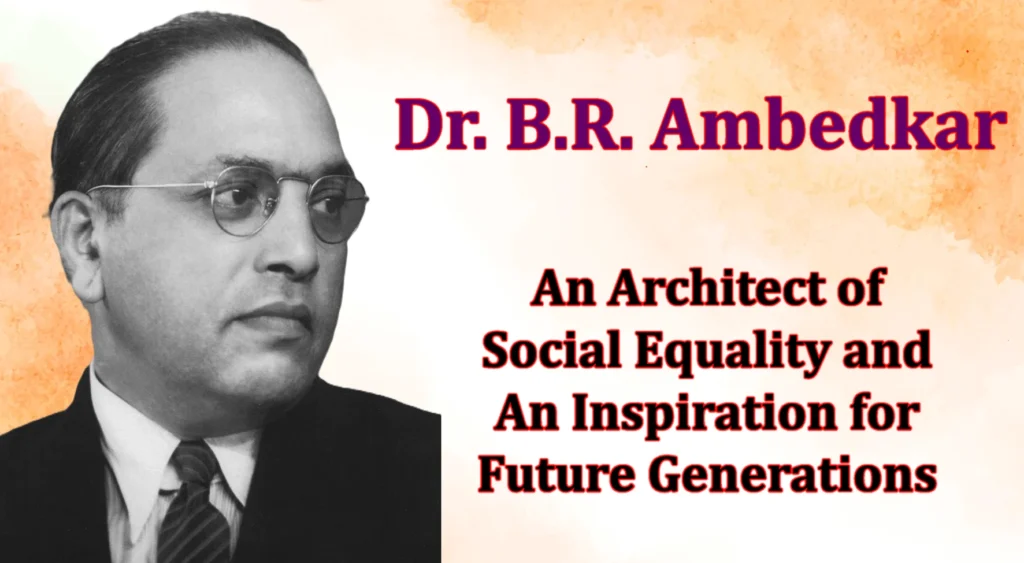
Introduction
Brief introduction to Dr. B.R. Ambedkar
Dr. B.R. Ambedkar, born on April 14, 1891, in Mhow, India, was a prominent social reformer, jurist, economist, and the chief architect of the Indian Constitution. He belonged to the marginalized Dalit community, historically oppressed and discriminated against in India’s caste-based social hierarchy. Despite facing immense societal barriers, Dr. Ambedkar rose to become one of the most influential figures in Indian history, dedicating his life to fighting against caste discrimination and advocating for the rights of marginalized communities.
Importance of exploring his life and legacy
Understanding Dr. B.R. Ambedkar’s life and legacy is crucial for several reasons. Firstly, his journey exemplifies the resilience and determination of an individual striving to overcome systemic oppression. Secondly, his ideas and principles continue to hold relevance in contemporary discussions on social justice, equality, and human rights. Lastly, studying his life can inspire future generations to challenge injustices and work towards building a more inclusive society.
This blog post will delve into the life of Dr. B.R. Ambedkar, starting from his early years and education, highlighting the challenges he faced and the milestones he achieved. It will also explore the influence of social injustices on his ideologies, shaping his vision for a more equitable society. Furthermore, the post will examine Dr. Ambedkar’s enduring legacy and the lessons his life imparts for future generations striving for social change and justice.
Early Life and Education
Background and childhood
Dr. B.R. Ambedkar’s journey began on April 14, 1891, in Mhow, a town and military cantonment in what is now Dr. Ambedkar Nagar, Madhya Pradesh. He was born into a family of Marathi background, hailing from the town of Ambadawe in Ratnagiri district, Maharashtra. His parents, Ramji Maloji Sakpal and Bhimabai Sakpal, belonged to the Mahar caste, considered untouchables and subjected to severe socio-economic discrimination.
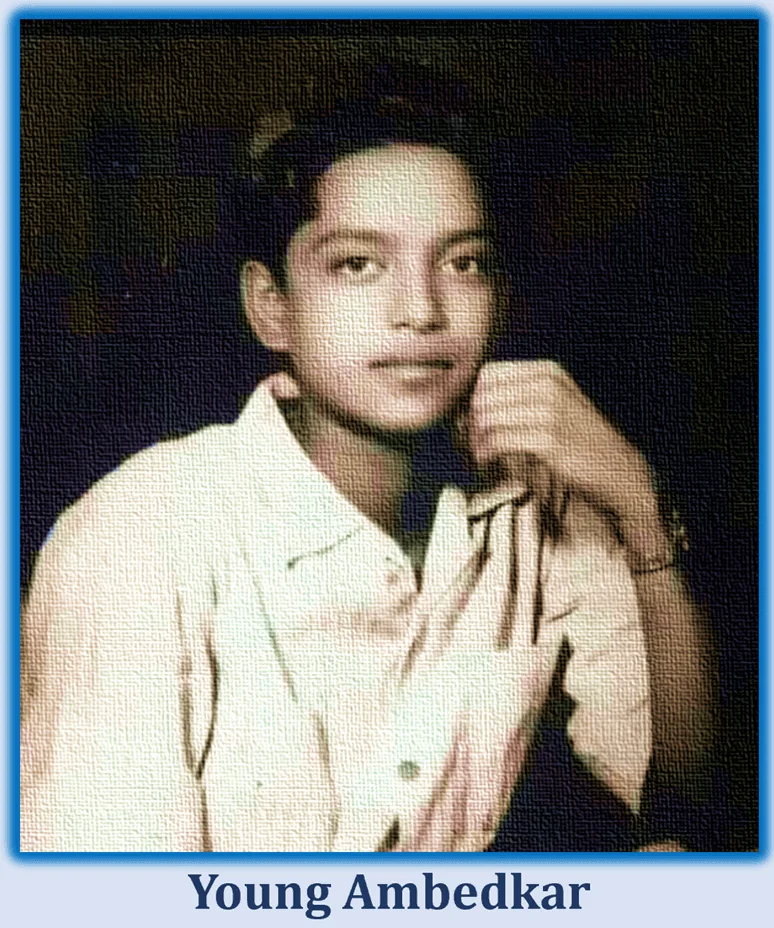
Ambedkar’s early years were marked by hardship and injustice. Despite his father’s service in the British Indian Army, the family faced discrimination and marginalization due to their caste. At the tender age of 15, in 1906, Ambedkar entered into an arranged marriage with Ramabai, a nine-year-old girl, as was customary at the time. Even in school, Ambedkar and other untouchable children were segregated, receiving little attention or assistance from teachers. They were denied basic rights such as sitting inside the classroom or touching water vessels directly. The discrimination extended to simple tasks like fetching water, which required assistance from higher caste individuals. This dehumanizing treatment left a lasting impact on young Ambedkar, shaping his resolve to fight against social injustices.
Pursuit of education against all odds
In 1907, Ambedkar accomplished a significant milestone by passing his matriculation examination. The following year, he broke barriers by becoming the first student from his Mahar caste to enroll at Elphinstone College, affiliated with the University of Bombay. Despite this achievement, he remained acutely aware of the disparities in educational opportunities among different communities.
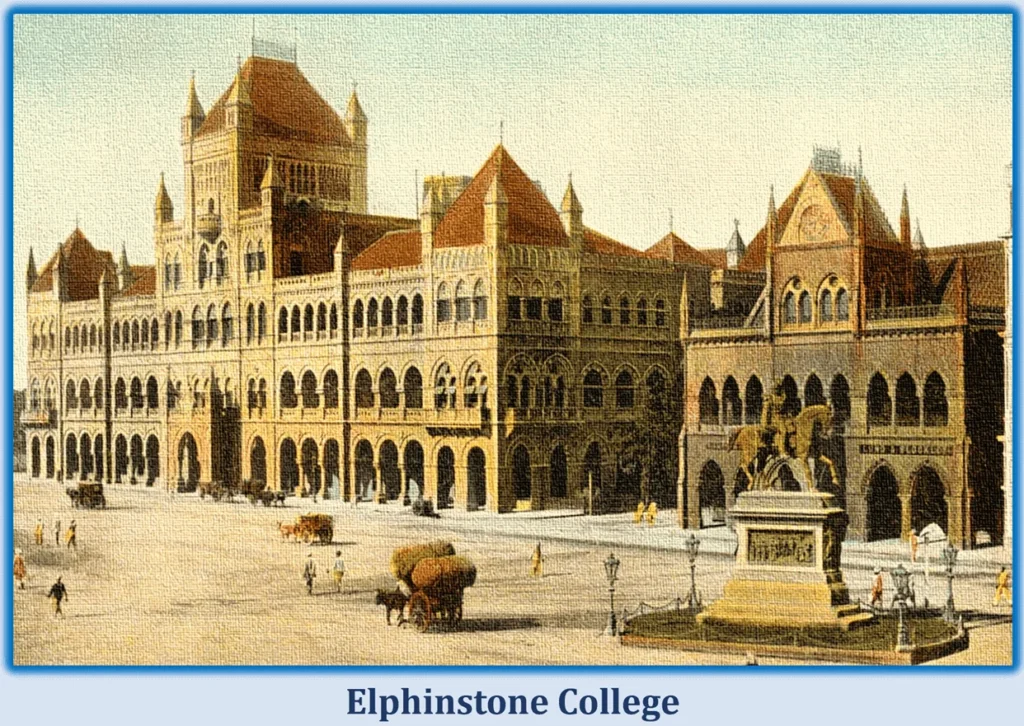
Ambedkar’s academic pursuits continued to soar. In 1912, he graduated from Bombay University with a degree in economics and political science, setting the stage for his future endeavors. However, personal tragedy struck when he lost his father in 1913, just as he was preparing to embark on a career with the Baroda state government.
Undeterred by adversity, Ambedkar’s determination led him to seize a prestigious scholarship in 1913, awarded by Sayajirao Gaekwad III, the Gaekwad of Baroda. This scholarship opened doors for postgraduate studies at Columbia University in New York City, where he immersed himself in academia.
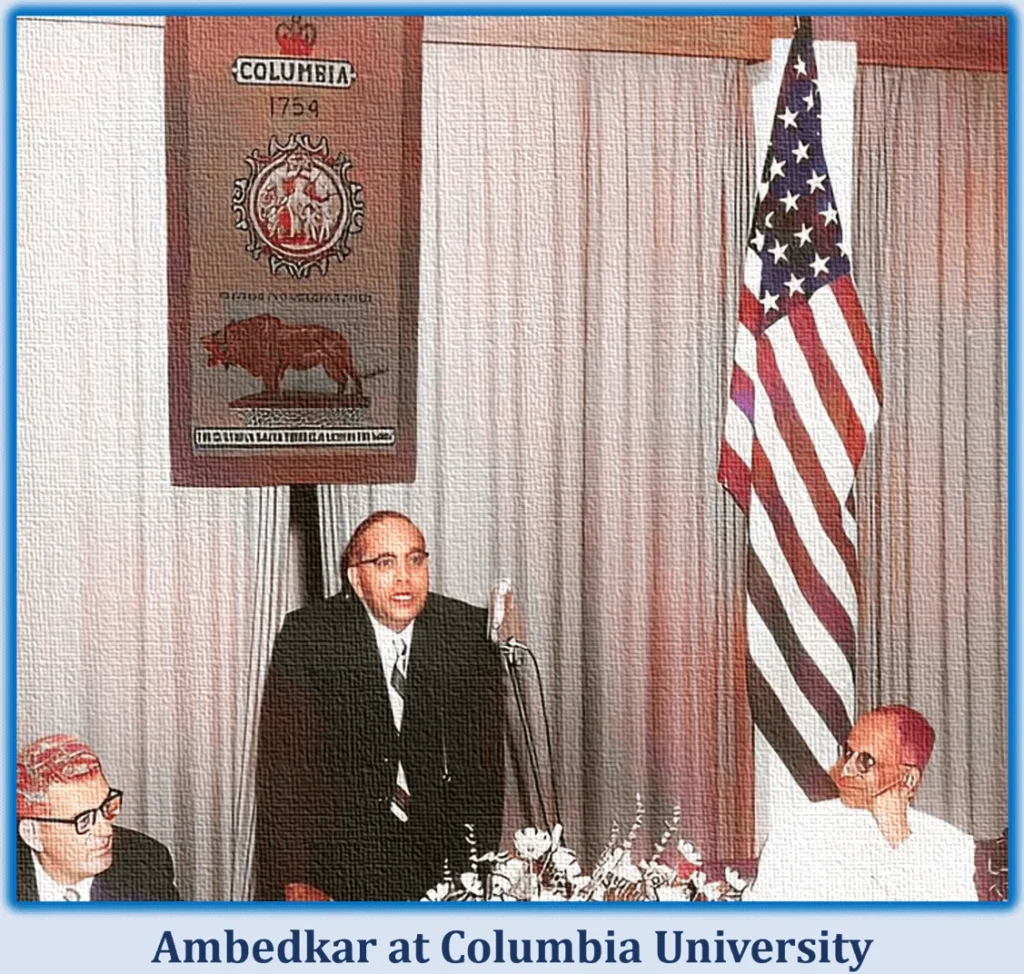
In the hallowed halls of Columbia University, Ambedkar’s intellect flourished. Under the mentorship of scholars like John Dewey, he delved into subjects ranging from economics to sociology and anthropology. His seminal thesis on Ancient Indian Commerce exemplified his scholarly prowess and marked the beginning of his academic legacy.
Despite facing logistical setbacks, such as the loss of his book collection in a torpedo attack, Ambedkar remained undeterred. He returned to London, where he pursued further studies at Gray’s Inn and the London School of Economics, culminating in a master’s degree in 1921 and a Doctor of Science in Economics in 1923.
Ambedkar’s journey exemplifies the triumph of perseverance over adversity, showcasing his unwavering commitment to education despite facing formidable odds. His relentless pursuit of knowledge laid the foundation for his transformative role as a champion of social justice and equality.
Influence of Social Injustices on His Ideologies
The injustices experienced by Ambedkar during his formative years profoundly shaped his ideologies and fueled his lifelong commitment to social reform. His firsthand encounters with caste-based discrimination instilled in him a deep empathy for the oppressed and marginalized communities.
The indignities suffered by Ambedkar at school, where he was forced to sit on a gunny sack and endure the humiliation of being denied water, underscored the systemic injustices entrenched in Indian society. These experiences ignited a fire within him to challenge the status quo and advocate for the rights and dignity of Dalits and other marginalized groups.
Moreover, his encounters with progressive educators and mentors, such as his Marathi Brahmin teacher Krishnaji Keshav Ambedkar, played a pivotal role in shaping his intellectual development and instilling in him a sense of pride in his identity.
Ambedkar’s transformative journey from a marginalized child denied basic human rights to a towering figure in the fight for social justice serves as a poignant reminder of the power of education, resilience, and unwavering determination in overcoming adversity.
Leadership in the Fight Against Caste Discrimination
Role in social and political reform movements
Ambedkar’s journey as a social and political reformer was marked by relentless advocacy and activism. Despite facing personal setbacks and societal prejudices, he emerged as a beacon of hope for the marginalized communities.
After experiencing discrimination in various professions, Ambedkar found his calling in academia, becoming a professor of political economy at Sydenham College of Commerce and Economics in Mumbai in 1918. His teachings were enlightening, but his shared drinking-water jug with students drew objection from other professors, highlighting the pervasive caste-based discrimination even within educational institutions.
His involvement in social and political movements intensified with time. He used platforms like the weekly publication Mooknayak, launched in 1920 with the support of Shahu IV of Kolhapur, to amplify the voices of the oppressed and demand social justice.
Ambedkar’s legal expertise further empowered him to challenge the status quo. Notably, in 1926, he successfully defended non-Brahmin leaders accused of libel against the Brahmin community, securing a significant victory for his clients and underscoring his commitment to justice.
Advocacy for Dalit rights and social justice
Dr. Ambedkar was a champion of Dalit rights and social justice. He advocated for the upliftment of marginalized communities and the abolition of untouchability. He championed several initiatives aimed at spreading education and culture among the untouchables, including setting up the ‘Bahishkrit Hitkarini Sabha (Outcastes Welfare Association)’ in 1923. The organization was devoted to spreading education and culture among the untouchables, and it played a crucial role in the temple entry movement launched by Dr. Ambedkar in 1930 at the Kalaram temple in Nasik.
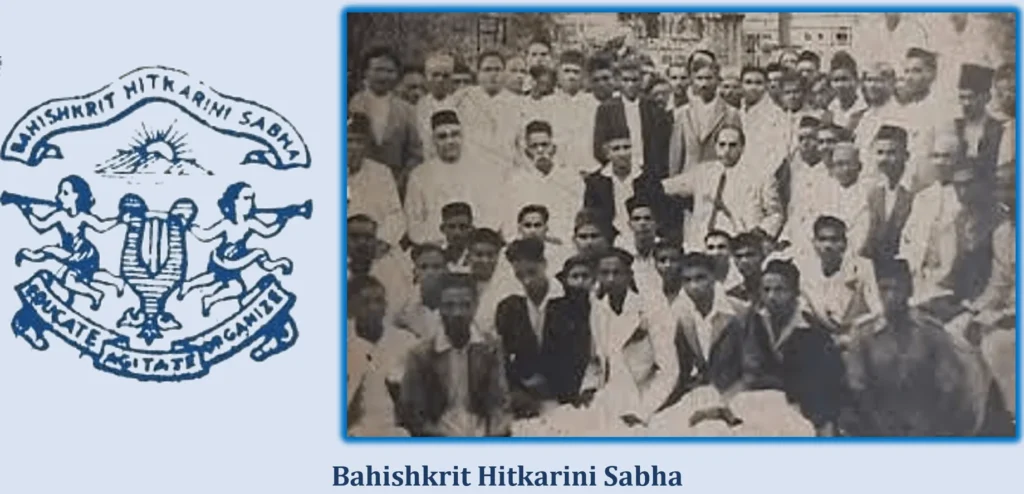
Dr. Ambedkar’s advocacy for Dalit rights also extended to the political sphere. He vehemently opposed the practice of child marriage and advocated for setting a minimum age for marriage, ensuring the well-being and empowerment of young girls. He fought against dowry, which he viewed as an exploitative and oppressive practice. Furthermore, he emphasized the need for gender equality in employment, advocating for equal pay for equal work and breaking down occupational barriers that limited women’s career choices.
Significance of the Poona Pact for Depressed Classes
Following Ambedkar’s participation in the Round Table Conferences, the British colonial government unveiled a groundbreaking measure—the formation of a separate electorate for the “Depressed Classes” in the 1932 Communal Award. However, this move sparked fierce opposition from Mahatma Gandhi, who feared it would fracture Hindu unity. Gandhi’s protest took the form of a fast while incarcerated in the Yerwada Central Jail of Poona. Subsequently, joint meetings organized at Yerwada, attended by prominent figures like Madan Mohan Malaviya and Palwankar Baloo, paved the way for the historic Poona Pact signed on September 25, 1932.
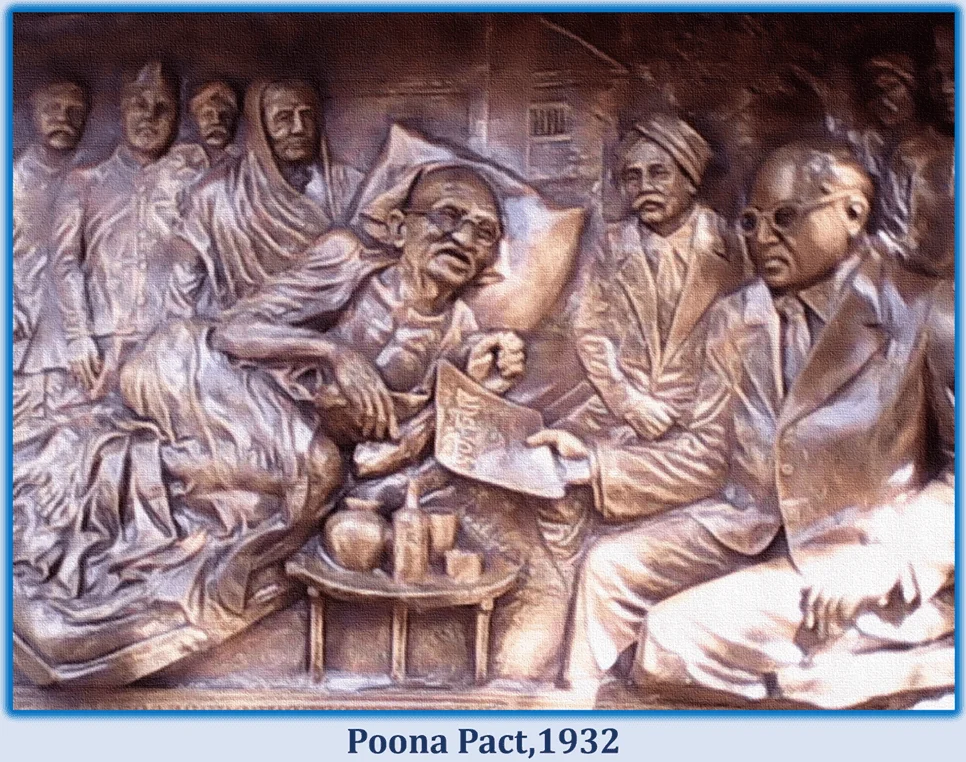
Crafted by Ambedkar and Malaviya, the Poona Pact granted reserved seats for the Depressed Classes in the Provisional legislatures, substantially increasing their representation to 148 seats from the initial 71 proposed under the Communal Award. While the term “Depressed Classes” denoted Untouchables among Hindus, later recognized as Scheduled Castes and Scheduled Tribes, the pact aimed to create a unified electorate, with primary and secondary elections enabling Untouchables to select their candidates. This landmark agreement not only fostered political empowerment but also laid the groundwork for future legislative reforms, leaving an indelible mark on India’s socio-political landscape.
Political Philosophy
Ambedkar’s Political Career
In 1935, Dr. B.R. Ambedkar assumed the role of principal at the Government Law College, Bombay, a position he held for two transformative years. Additionally, he took on the chairmanship of the Governing body of Ramjas College, University of Delhi, following the passing of its founder, Shri Rai Kedarnath. Amidst these professional endeavors, Ambedkar made Bombay (now Mumbai) his home, overseeing the construction of a residence while expanding his personal library, which eventually housed over 50,000 books.
Tragically, this year also saw the loss of his wife, Ramabai, who had expressed a desire to embark on a pilgrimage to Pandharpur. In response, Ambedkar vowed to create a new Pandharpur for her, rejecting the discriminatory practices of Hinduism’s Pandharpur, which treated them as untouchables.
In 1936, Ambedkar made significant strides in both political and literary spheres. He established the Independent Labour Party, which contested the 1937 Bombay election to the Central Legislative Assembly, securing notable victories. Simultaneously, he published his groundbreaking book, “Annihilation of Caste,” a scathing critique of Hindu orthodox religious leaders and the pervasive caste system. Notably, the book included a rebuke of Gandhi, sparking intellectual discourse and debate.
Throughout this period, Ambedkar continued his tireless advocacy for social justice and reform. He waged battles against the khoti system in Konkan and introduced legislation aimed at abolishing it in the Bombay Legislative Assembly. Moreover, he served on various advisory committees and councils, leveraging his influence to champion the rights of marginalized communities.
Ambedkar’s involvement in significant events, such as the Day of Deliverance and the Lahore resolution of the Muslim League demanding Pakistan, underscored his deep commitment to political and social transformation. His tract, “Thoughts on Pakistan,” ignited crucial discussions on the partition of India, shaping the course of dialogue between the Muslim League and the Indian National Congress.
In addition, Ambedkar’s commitment to comprehending and resolving the causes of caste-based oppression was demonstrated by his academic writings, such as “Who Were the Shudras?” and his supervision of his political party’s conversion into the Scheduled Castes Federation.
His inclusion in Nehru‘s cabinet, facilitated by Gandhi, marked a pivotal moment in his political career, culminating in his appointment as the law minister of India in 1947. Later he resigned from the Cabinet in 1951 over his differences on Hindu Code Bill.
Ambedkar’s Role in India’s Constitutional Framework
Drafting of the Indian Constitution
In 1925, Dr. B.R. Ambedkar’s pivotal appointment to the Bombay Presidency Committee marked a significant juncture in his journey as a reformer. Tasked with collaborating with the all-European Simon Commission, this appointment thrust him into the heart of a contentious period in India’s history. The Simon Commission, met with widespread protests across the nation, symbolizing the Indian people’s fervent desire for self-determination and representation.
Ambedkar’s role within this committee was distinctive. While the Simon Commission’s report was largely disregarded by the Indian populace, Ambedkar seized the opportunity to draft a separate set of recommendations for India’s future Constitution. Recognizing the importance of this moment in shaping India’s destiny, he meticulously crafted proposals that reflected his vision of a just and inclusive society.
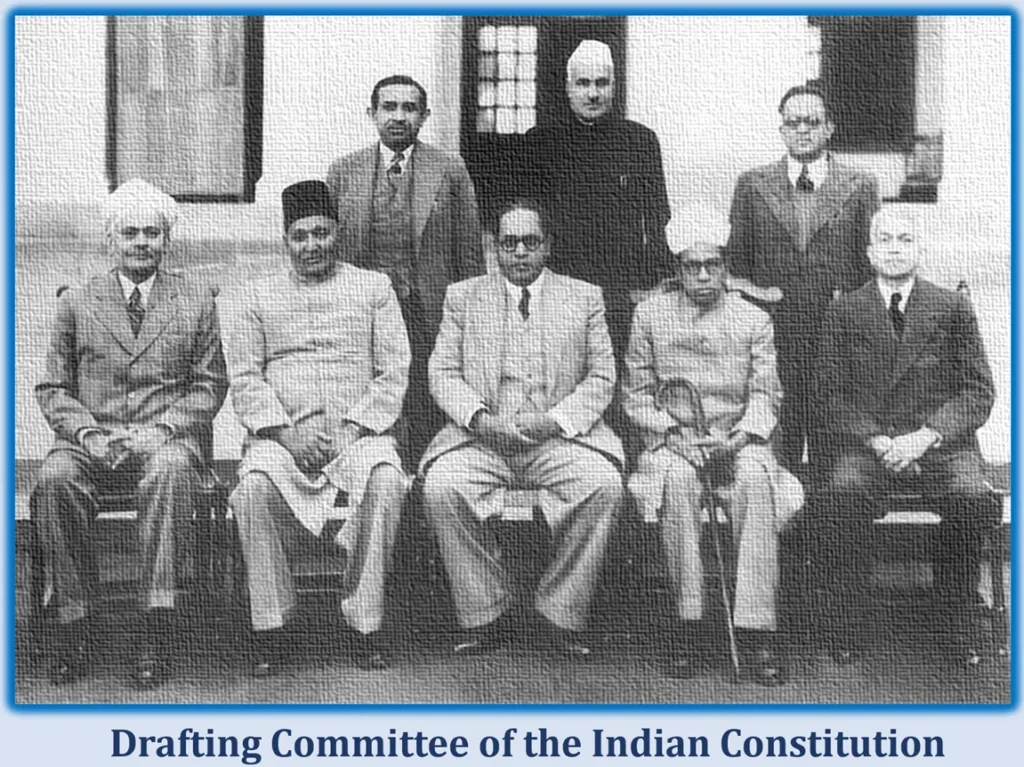
His recommendations stood as a testament to his foresight and commitment to democratic principles, laying the groundwork for the constitutional framework that would guide India’s journey as an independent nation. Amidst the tumult of political upheaval, Ambedkar’s singular focus on advancing the interests of marginalized communities resonated as a beacon of hope for a more equitable future.
Later when he was appointed as the chairman of the Drafting Committee on 29th, August,1947, he meticulous approach to drafting the Constitution emphasized the importance of creating a framework that would safeguard the rights and liberties of all citizens, regardless of caste, creed, or socio-economic status. His unwavering commitment to inclusivity and social justice laid the foundation for a transformative legal document that continues to guide India’s democratic institutions.
Emphasis on Fundamental Rights and Liberties
One of the hallmarks of Ambedkar’s political philosophy was his emphasis on fundamental rights and liberties. He recognized the fundamental importance of ensuring that every citizen had the right to life, liberty, and equality before the law. As the principal architect of the Constitution, he advocated for the inclusion of robust provisions safeguarding these rights.
Ambedkar’s vision for India’s constitutional framework extended beyond legalistic principles to encompass the broader goal of creating a society where every individual could flourish and fulfill their potential. His insistence on enshrining fundamental rights in the Constitution was a reflection of his belief in the inherent dignity and worth of every human being.
Political Struggles and Advocacy for Marginalized Communities
Ambedkar’s political struggles and advocacy for marginalized communities were at the forefront of his activism. Throughout his life, he fought tirelessly to challenge the entrenched hierarchies of caste-based discrimination and social inequality. From leading movements against untouchability to advocating for Dalit rights and representation, his political activism was grounded in a commitment to social justice.
Ambedkar’s advocacy extended beyond legal and political realms to encompass grassroots mobilization and community empowerment. He sought to uplift marginalized communities through education, economic empowerment, and political mobilization, recognizing that true social change required both structural reforms and grassroots empowerment.
Political Philosophy and its Significance in Indian Politics
Ambedkar’s political philosophy continues to resonate in Indian politics today, shaping debates on democracy, social justice, and representation. His insistence on the primacy of fundamental rights and liberties, coupled with his unwavering commitment to inclusivity and equality, provides a moral compass for navigating the complexities of Indian democracy
Furthermore, Ambedkar’s emphasis on the need for political representation and empowerment for marginalized communities has influenced generations of political leaders and activists. His teachings on the importance of constitutional morality and the rule of law remain relevant in a society grappling with issues of identity, inequality, and justice.
Educational Philosophy
Education as a Tool for Social Empowerment
Dr. B.R. Ambedkar’s educational philosophy was rooted in the belief that education is a potent instrument for social empowerment and liberation. Throughout his life, he emphasized the transformative power of education in challenging oppressive systems and empowering marginalized communities.
Ambedkar viewed education not merely as a means to acquire knowledge and skills but as a catalyst for social change and upliftment. He recognized that access to quality education was essential for breaking the cycle of poverty and oppression perpetuated by caste-based discrimination. Through education, individuals could gain the confidence, knowledge, and skills necessary to assert their rights and contribute meaningfully to society.
Ambedkar’s advocacy for education extended beyond formal schooling to encompass lifelong learning and intellectual development. He emphasized the importance of critical thinking, rationality, and enlightenment in fostering a society based on principles of equality, justice, and human dignity.
Educational Institutions for Marginalized Communities
Central to Ambedkar’s educational philosophy was the establishment of educational institutions specifically tailored to the needs of marginalized communities. Recognizing the systemic barriers faced by Dalits and other oppressed groups in accessing mainstream education, he championed the creation of institutions that provided quality education in a supportive and inclusive environment.
Ambedkar founded institutions such as the Bahishkrit Hitakarini Sabha, which aimed to promote education and socio-economic improvement among the depressed classes. These institutions not only provided academic instruction but also served as centers of community empowerment, offering guidance, mentorship, and support to students from marginalized backgrounds.
Moreover, Ambedkar advocated for affirmative action policies and reservations in educational institutions to ensure equitable access to opportunities for historically disadvantaged groups. He believed that such measures were essential for leveling the playing field and creating a more just and inclusive society.
Educational Philosophy and its Impact on Indian Society
Ambedkar’s educational philosophy has had a profound impact on Indian society, shaping attitudes towards education, social mobility, and equality. His emphasis on education as a tool for social empowerment has inspired generations of activists, educators, and policymakers to prioritize investments in education as a means of addressing social inequities.
The establishment of educational institutions for marginalized communities has provided pathways for upward mobility and empowerment, enabling individuals to break free from the shackles of caste-based discrimination and realize their full potential. These institutions have served as catalysts for social change, fostering a sense of pride, agency, and resilience among historically marginalized groups.
Furthermore, Ambedkar’s advocacy for inclusive education and affirmative action policies has catalyzed efforts to create a more inclusive and equitable educational system. His vision of education as a fundamental human right, accessible to all regardless of caste, creed, or socio-economic status, continues to shape debates and policies on education in contemporary India.
Religious Philosophy of Ambedkar
Burning of Manusmriti
In 1927, Dr. B.R. Ambedkar embarked on a journey of activism against untouchability that would leave an indelible mark on Indian society. Recognizing the urgent need for change, he initiated bold movements aimed at dismantling the barriers of caste-based discrimination.
His efforts began with public movements and marches to demand access to public drinking water resources, challenging the segregation that relegated certain communities to inferior facilities. In a courageous act of resistance, he led a satyagraha in Mahad, advocating for the right of the untouchable community to draw water from the main water tank of the town, a symbol of equality and dignity.
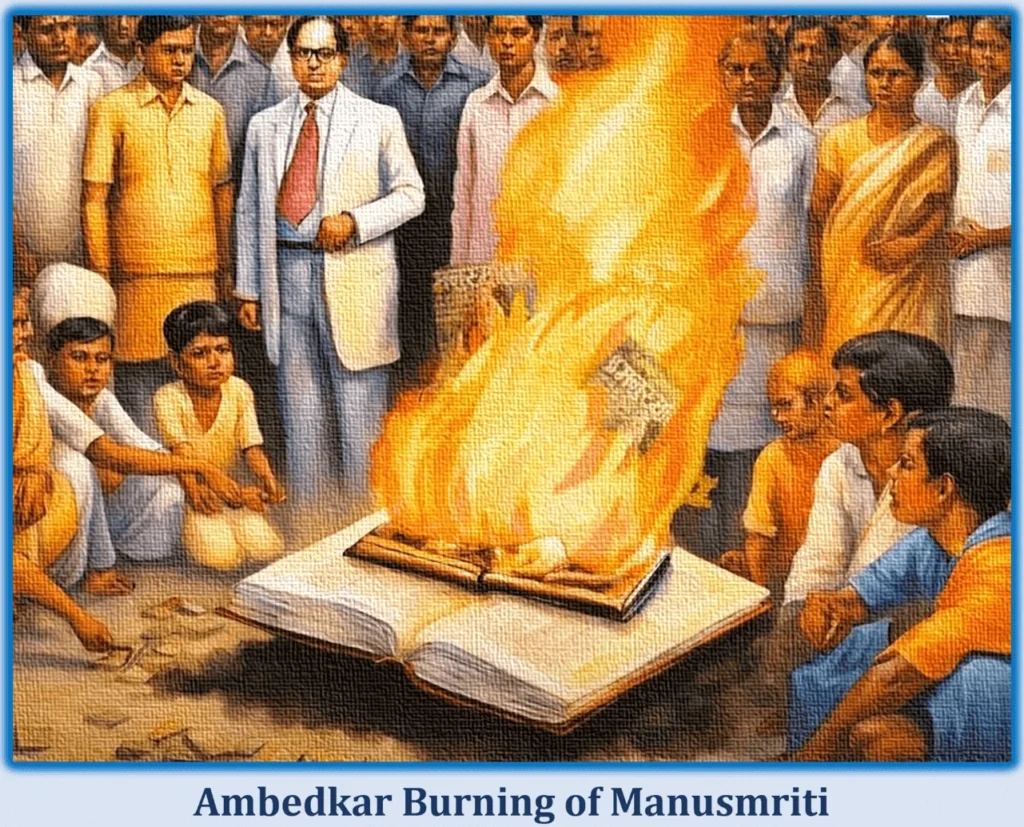
Ambedkar’s activism extended to the realm of religion, where he confronted the entrenched prejudices of caste discrimination. In a pivotal conference, he publicly condemned the Manusmriti, a revered Hindu text, for perpetuating caste-based inequalities and “untouchability”. In a powerful act of defiance, he ceremonially burned copies of the Manusmriti, signaling a rejection of its oppressive teachings.
On December 25, 1927, thousands of followers joined Ambedkar in burning copies of the Manusmriti, marking a symbolic moment of resistance and liberation. This day, now commemorated as Manusmriti Dahan Din, serves as a reminder of the ongoing struggle against caste discrimination and a celebration of Ambedkar’s legacy as a champion of social justice and equality.
Ambedkar’s Conversion to Buddhism
Dr. B.R. Ambedkar’s religious philosophy was deeply intertwined with his lifelong struggle against caste-based discrimination and social inequality. In 1956, he made a momentous decision to renounce Hinduism and embrace Buddhism, marking a profound shift in his spiritual journey. He established another sect of Buddhism Known as “Navayana” leading to a large scale conversion especially in Maharashtra.
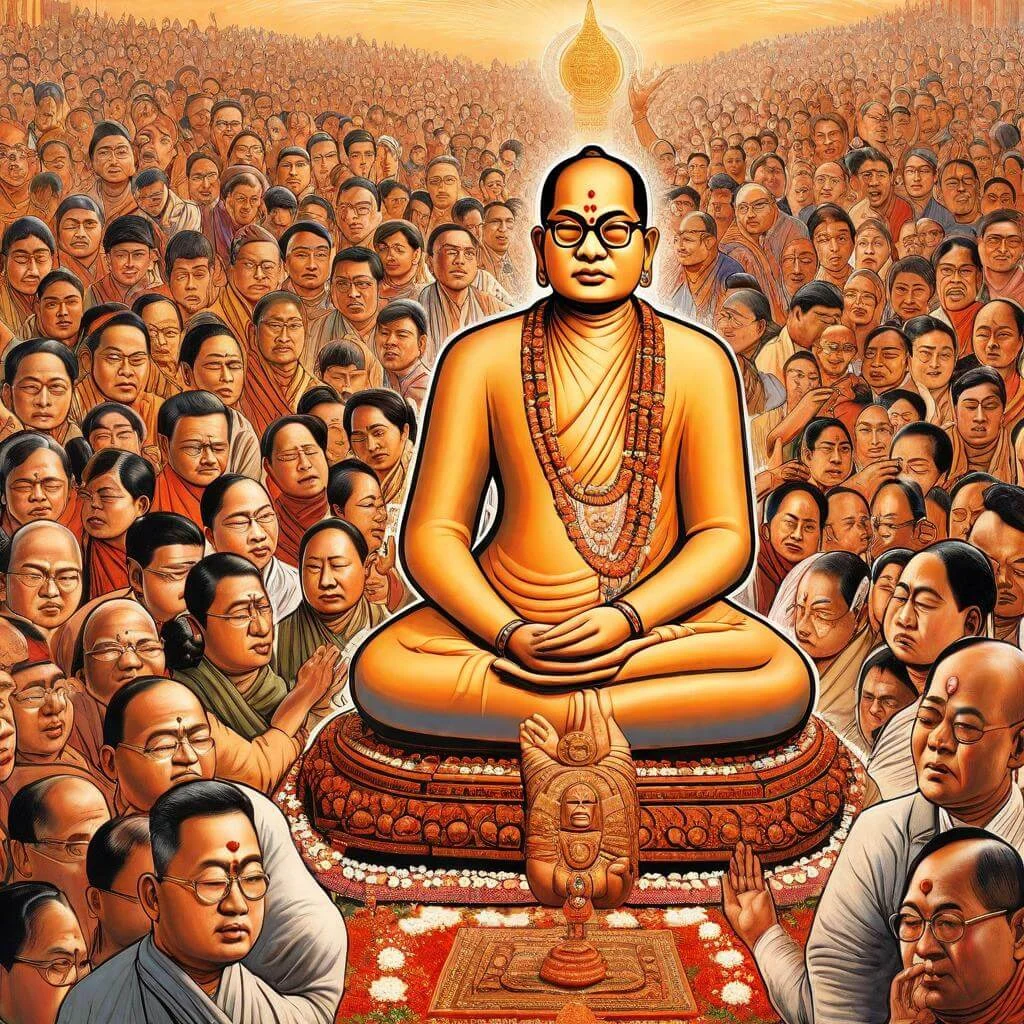
Ambedkar’s conversion to Buddhism was a deliberate act of defiance against the oppressive caste system and the inherent discrimination embedded within Hinduism. He saw Buddhism as a liberating force that offered equality, dignity, and social justice to all individuals, irrespective of their caste or social status.
The conversion ceremony, attended by hundreds of thousands of followers, symbolized a rejection of the oppressive hierarchies of caste and a reaffirmation of the principles of equality and human dignity. For Ambedkar, Buddhism represented not only a religious faith but also a powerful tool for social transformation and emancipation.
Religious Philosophy and its Implications for Religious Reform in India
Ambedkar’s religious philosophy has profound implications for religious reform in India. His conversion to Buddhism served as a powerful catalyst for religious revitalization and social reform, inspiring millions of followers to embrace a faith that rejected caste-based discrimination and embraced the principles of equality and social justice.
Furthermore, Ambedkar’s critique of caste-based discrimination in religion continues to resonate in contemporary India, sparking debates and discussions on the need for religious reform and social inclusion. His teachings have inspired movements for religious equality and interfaith harmony, challenging traditional hierarchies and prejudices within religious communities.
Ultimately, Ambedkar’s religious philosophy serves as a beacon of hope for a more inclusive and egalitarian society, where individuals are free to practice their faith without fear of discrimination or persecution. His legacy continues to inspire generations of activists and reformers to strive for a world where religion is a force for unity, compassion, and social justice.
Ambedkar’s Economic Vision
Ambedkar, distinguished as the first Indian to pursue a doctorate in economics abroad, envisioned a robust economic framework for India’s growth. His seminal works highlighted the pivotal role of industrialization and agricultural advancement in fostering economic prosperity. Advocating for national economic and social development, he underscored the importance of education, public hygiene, and community health as foundational pillars. In his pioneering DSc thesis, “The Problem of the Rupee: Its Origin and Solution,” Ambedkar scrutinized the factors influencing the devaluation of the Rupee, advocating for a modified gold standard to stabilize currency rates.
Analyzing revenue systems in his PhD dissertation, “The Evolution of Provincial Finance in British India,” Ambedkar emphasized the principles of fiscal fidelity, wisdom, and economy in government expenditures. He opposed income tax for low-income groups and championed policies in land revenue tax and excise duties to bolster economic stability. Propounding his theory of State Socialism, he advocated for state ownership of agricultural land and equitable resource distribution.
Ambedkar’s economic ideology, influenced by the Austrian school of economics, resonated with the principles of renowned economists like Carl Menger and Ludwig von Mises. His advocacy for free banking and the optimal utilization of agricultural land reflected a deep understanding of economic principles. Despite his profound insights, some of his recommendations, such as free banking, were overlooked by governmental bodies.
Transitioning from a professional economist to a political leader, Ambedkar’s economic legacy endures through his scholarly contributions, which continue to inspire economic policies and discourse in India.
Legacy and Impact
Posthumous recognition and honors
Dr. B R Ambedkar, a towering figure in Indian history, has been posthumously honored and recognized for his exceptional contributions to various fields. Among the noteworthy accolades and distinctions conferred upon him are:
- Bharat Ratna: In 1990, Dr. B R Ambedkar was posthumously awarded India’s highest civilian honor, the Bharat Ratna, in recognition of his immense contributions to nation-building and social reform.
- Ambedkar Jayanti: April 14th is celebrated annually in India as “Ambedkar Jayanti” to commemorate the birth anniversary of Dr. B R Ambedkar. It is observed as a public holiday in many Indian states.
- Institutions and Endowments: Several educational institutions, research centers, and scholarships have been established in Dr. Ambedkar’s name to promote education and social welfare among marginalized communities.
- Dr. B R Ambedkar International Award: It was constituted in 1995 to recognize the contributions of individuals/ society in the field of social reform.
These awards and honors reflect the profound impact of Dr. B R Ambedkar’s ideas and activism on Indian society and underscore his enduring legacy as a champion of social justice and equality.
Influence on Indian society and politics
Ambedkar’s influence on Indian society and politics is profound and far-reaching. His tireless advocacy for social justice, equality, and the rights of marginalized communities catalyzed significant reforms in India’s social and political landscape. His pivotal role in drafting the Indian Constitution, particularly in championing fundamental rights and liberties, continues to shape the nation’s governance and legal framework. Moreover, his steadfast commitment to dismantling caste-based discrimination inspired movements for social reform and empowerment, leaving an indelible mark on the collective consciousness of the nation.
Continuing relevance of his ideas and teachings
Ambedkar’s ideas and teachings remain highly relevant in contemporary India. His emphasis on the importance of education as a tool for empowerment resonates deeply in a society striving for inclusive growth and development. Furthermore, his unwavering commitment to principles of equality, justice, and human rights serves as a guiding beacon for addressing ongoing socio-economic disparities and fostering a more equitable society. As India navigates its journey towards progress and prosperity, Ambedkar’s teachings continue to inspire generations to uphold the values of resilience, determination, and social reform.
Lessons for Future Generations
Importance of resilience and determination in the face of adversity
Ambedkar’s life epitomizes resilience and determination in the face of immense adversity. Despite facing discrimination and hardship, he pursued education relentlessly and emerged as a beacon of hope for millions. His journey underscores the transformative power of resilience, inspiring future generations to persevere in the pursuit of their dreams despite formidable challenges.
Commitment to principles of equality, justice, and human rights
Ambedkar’s unwavering commitment to principles of equality, justice, and human rights serves as a timeless lesson for future generations. His relentless advocacy for the rights of marginalized communities highlights the imperative of standing up against injustice and discrimination in all its forms. His life’s work underscores the importance of championing inclusivity and equity to build a more just and compassionate society.
Embracing education as a means of empowerment and social change
Ambedkar’s profound belief in the transformative power of education underscores the importance of knowledge as a catalyst for social change and empowerment. His emphasis on education as a fundamental tool for emancipation and progress resonates deeply in a world grappling with inequality and injustice. As we chart the path forward, Ambedkar’s teachings inspire future generations to embrace education as a vehicle for individual empowerment and collective transformation.
Conclusion & FAQs
Dr. B.R. Ambedkar, a visionary social reformer, jurist, and political leader, left an indelible mark on Indian society through his relentless pursuit of social justice, equality, and human rights. Born into a marginalized community, he overcame immense obstacles to become the architect of India’s Constitution and a beacon of hope for millions. His advocacy for Dalit rights, gender equality, and the eradication of caste discrimination continues to inspire generations worldwide.
As we reflect on Dr. Ambedkar’s legacy, it is imperative that we honor his memory by actively promoting social justice, equality, and inclusivity in our communities. We must strive to uphold the values he stood for and work towards creating a more just and equitable society for all. By advocating for the rights of marginalized communities, challenging discriminatory practices, and fostering dialogue on social issues, we can carry forward Dr. Ambedkar’s vision of a more inclusive and compassionate world.
In conclusion, Dr. B.R. Ambedkar’s legacy serves as a guiding light for those committed to social justice, equality, and human dignity. Let us honor his memory by standing up against injustice, advocating for the rights of the marginalized, and working towards a more inclusive and compassionate society. Together, we can continue Dr. Ambedkar’s legacy of empowerment, equality, and social transformation for a brighter and more just future.
Frequently Asked Questions (FAQs)
What were Dr. Ambedkar’s contributions to Indian society?
Dr. Ambedkar made significant contributions to Indian society across various domains. His efforts in drafting the Indian Constitution laid the foundation for democratic governance and fundamental rights in India. He also led movements for social justice, including the fight against caste-based discrimination and untouchability. Additionally, Ambedkar emphasized the importance of education as a tool for social empowerment and advocated for economic reforms to uplift marginalized communities.
What is Dr. B R Ambedkar’s legacy?
Dr. B R Ambedkar’s legacy is multifaceted and enduring. He is revered as the principal architect of the Indian Constitution and is affectionately referred to as the “Father of the Indian Constitution.” His tireless advocacy for social justice and equality continues to inspire movements for marginalized communities worldwide. Ambedkar’s teachings on democracy, secularism, and social reform remain relevant in contemporary India and serve as guiding principles for building an inclusive society.
What were some of Dr. Ambedkar’s key beliefs and philosophies?
Dr. Ambedkar’s beliefs and philosophies centered around the principles of equality, justice, and human dignity. He staunchly opposed caste-based discrimination and advocated for the annihilation of the caste system. Ambedkar emphasized the importance of education as a means of empowerment and social transformation. Additionally, he championed economic reforms aimed at addressing socio-economic disparities and promoting inclusive growth.
How did Dr. Ambedkar impact the Dalit movement in India?
Dr. Ambedkar played a pivotal role in the Dalit movement in India by providing a voice to the oppressed and marginalized communities. He led movements against untouchability and caste discrimination, advocating for the rights and dignity of Dalits. Ambedkar’s efforts culminated in the inclusion of provisions for affirmative action and social justice in the Indian Constitution, empowering Dalits and other marginalized groups.
What is Dr. Ambedkar’s significance in modern India?
In modern India, Dr. Ambedkar remains an iconic figure whose legacy continues to shape the nation’s socio-political landscape. His advocacy for equality, social justice, and empowerment resonates deeply in a society grappling with persistent socio-economic disparities and discrimination. Ambedkar’s teachings serve as a guiding light for addressing contemporary challenges and striving towards a more inclusive and equitable society.
